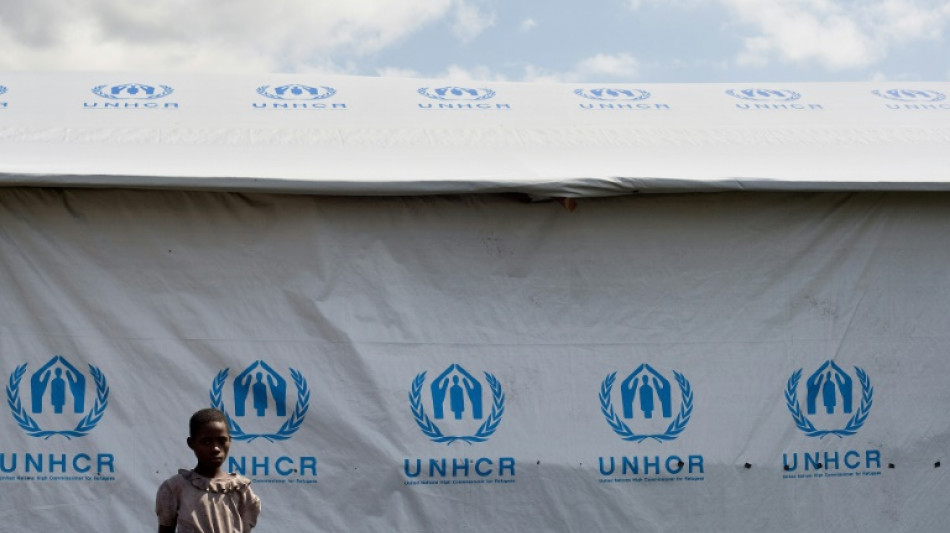
-
 Trump vows revenge after troops in Syria killed in alleged IS ambush
Trump vows revenge after troops in Syria killed in alleged IS ambush
-
Maresca bemoans 'worst 48 hours at Chelsea' after lack of support

-
 Teenage pair Ndjantou, Mbaye star as PSG beat Metz to go top
Teenage pair Ndjantou, Mbaye star as PSG beat Metz to go top
-
Drone strike in southern Sudan kills 6 UN peacekeepers
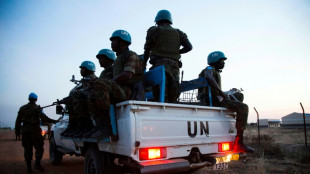
-
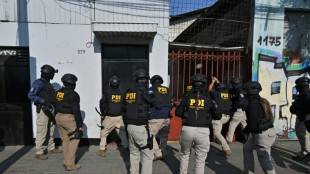 Crime wave propels hard-right candidate toward Chilean presidency
Crime wave propels hard-right candidate toward Chilean presidency
-
Terrific Terrier backheel helps lift Leverkusen back to fourth

-
 'Magic' Jalibert guides Bordeaux-Begles past Scarlets
'Magic' Jalibert guides Bordeaux-Begles past Scarlets
-
Teenage pair Ndjantou and Mbaye star as PSG beat Metz to go top

-
 Anglo-French star Jane Birkin gets name on bridge over Paris canal
Anglo-French star Jane Birkin gets name on bridge over Paris canal
-
US troops in Syria killed in alleged IS ambush

-
 Jalibert masterclass guides Bordeaux-Begles past Scarlets
Jalibert masterclass guides Bordeaux-Begles past Scarlets
-
M23 marches on in east DR Congo as US vows action against Rwanda
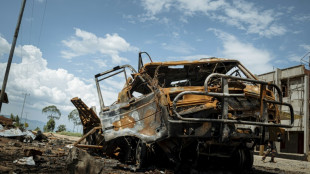
-
 Raphinha double stretches Barca's Liga lead in Osasuna win
Raphinha double stretches Barca's Liga lead in Osasuna win
-
Terrific Terrier returns Leverkusen to fourth

-
 Colts activate 44-year-old Rivers for NFL game at Seattle
Colts activate 44-year-old Rivers for NFL game at Seattle
-
US troops in Syria killed in IS ambush attack

-
 Liverpool's Slot says 'no issue to resolve' with Salah after outburst
Liverpool's Slot says 'no issue to resolve' with Salah after outburst
-
'Stop the slaughter': French farmers block roads over cow disease cull

-
 Stormers see off La Rochelle, Sale stun Clermont in Champions Cup
Stormers see off La Rochelle, Sale stun Clermont in Champions Cup
-
Maresca hails Palmer as Chelsea return to winning ways against Everton

-
 Hungarian protesters demand Orban quits over abuse cases
Hungarian protesters demand Orban quits over abuse cases
-
Belarus frees protest leader Kolesnikova, Nobel winner Bialiatski
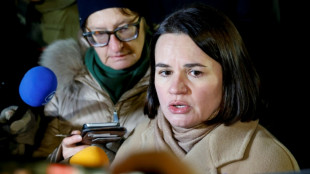
-
 Salah sets up goal on return to Liverpool action
Salah sets up goal on return to Liverpool action
-
Palmer strikes as Chelsea return to winning ways against Everton

-
 Pogacar targets Tour de France Paris-Roubaix and Milan-San Remo in 2026
Pogacar targets Tour de France Paris-Roubaix and Milan-San Remo in 2026
-
Salah back in action for Liverpool after outburst

-
 Atletico recover Liga momentum with battling win over Valencia
Atletico recover Liga momentum with battling win over Valencia
-
Meillard leads 'perfect' Swiss sweep in Val d'Isere giant slalom

-
 Salah on Liverpool bench for Brighton match
Salah on Liverpool bench for Brighton match
-
Meillard leads Swiss sweep in Val d'Isere giant slalom

-
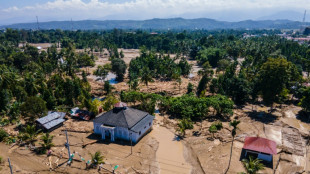 Indonesia flood death toll passes 1,000 as authorities ramp up aid
Indonesia flood death toll passes 1,000 as authorities ramp up aid
-
Cambodia shuts Thailand border crossings over deadly fighting
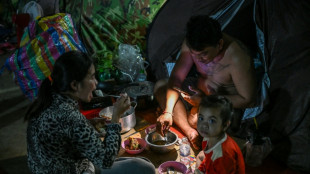
-
 First urban cable car unveiled outside Paris
First urban cable car unveiled outside Paris
-
Vonn second behind Aicher in World Cup downhill at St Moritz

-
 Aicher pips Vonn to downhill win at St Moritz
Aicher pips Vonn to downhill win at St Moritz
-
Thailand says 4 soldiers killed in Cambodia conflict, denies Trump truce claim
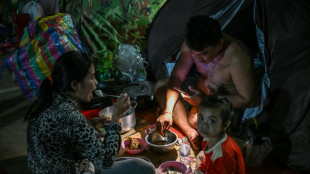
-
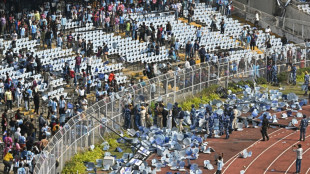 Fans vandalise India stadium after Messi's abrupt exit
Fans vandalise India stadium after Messi's abrupt exit
-
Women sommeliers are cracking male-dominated wine world open

-
 Exhibition of Franco-Chinese print master Zao Wou-Ki opens in Hong Kong
Exhibition of Franco-Chinese print master Zao Wou-Ki opens in Hong Kong
-
Myanmar junta denies killing civilians in hospital strike
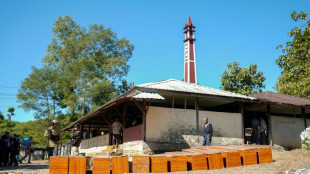
-
 Why SpaceX IPO plan is generating so much buzz
Why SpaceX IPO plan is generating so much buzz
-
Thailand continues Cambodia strikes despite Trump truce calls
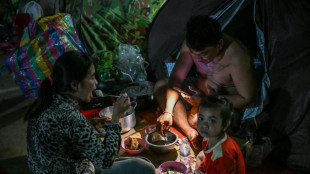
-
 US envoy to meet Zelensky, Europe leaders in Berlin this weekend
US envoy to meet Zelensky, Europe leaders in Berlin this weekend
-
North Korea acknowledges its troops cleared mines for Russia
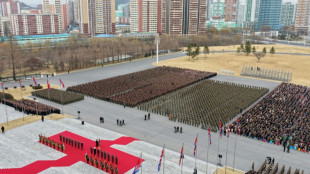
-
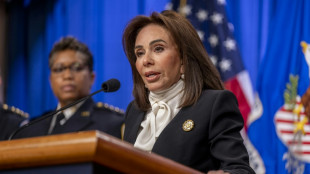 US unseals warrant for tanker seized off Venezuelan coast
US unseals warrant for tanker seized off Venezuelan coast
-
Cambodia says Thailand still bombing hours after Trump truce call
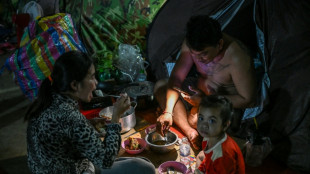
-
 Machado urges pressure so Maduro understands 'he has to go'
Machado urges pressure so Maduro understands 'he has to go'
-
Leinster stutter before beating Leicester in Champions Cup

-
 World stocks mostly slide, consolidating Fed-fuelled gains
World stocks mostly slide, consolidating Fed-fuelled gains
-
Crypto firm Tether bids for Juventus, is quickly rebuffed


UN slashes global aid plan over 'deepest funding cuts ever'
The United Nations said Monday it was drastically scaling back its global humanitarian aid plans because of the "deepest funding cuts ever" -- leaving tens of millions of people facing dire straits.
The UN's Office for the Coordination of Humanitarian Affairs (OCHA) said it was seeking $29 billion in funding for 2025 compared to the $44 billion originally requested in December, in a "hyper-prioritised" appeal.
Since US President Donald Trump returned to office in January, the United States -- the world's top donor -- has heavily slashed foreign aid, causing havoc in the humanitarian sector across the globe.
Drastic US funding cuts have had dramatic consequences for emergency aid, vaccination campaigns and the distribution of drugs to fight AIDS.
Other major donor countries have also cut back their contributions in the face of an uncertain economic outlook.
"Brutal funding cuts leave us with brutal choices," OCHA chief Tom Fletcher said in a statement.
"All we ask is one percent of what you chose to spend last year on war. But this isn't just an appeal for money -- it's a call for global responsibility, for human solidarity, for a commitment to end the suffering."
- 'Cruel', 'heartbreaking' -
In late April, while visiting a hospital in Kandahar in Afghanistan, Fletcher warned: "Cutting funding for those in greatest need is not something to boast about... The impact of aid cuts is that millions die."
With 2025 nearly halfway through, the UN has received only $5.6 billion out of the $44 billion originally sought for this year -- a mere 13 percent.
In total, the original plan covered more than 70 countries and aimed to assist nearly 190 million vulnerable people.
Even so, that plan acknowledged there were 115 million people the UN would not be able to reach.
"We have been forced into a triage of human survival," Fletcher said Monday.
The mathematics "is cruel, and the consequences are heartbreaking".
"Too many people will not get the support they need, but we will save as many lives as we can with the resources we are given," he said.
Aid will now be directed so that it can "reach the people and places facing the most urgent needs", with those in "extreme or catastrophic conditions" as the starting point, said Fletcher.
"This will ensure that limited resources are directed where they can do the most good -- as quickly as possible," the statement said.
- 'Red alert' -
Fletcher's call came as the UN's Food and Agriculture Organization (FAO) and World Food Programme (WFP) issued a joint early warning report identifying worsening hunger in 13 hotspots.
Five of those places are facing an immediate risk of starvation -- situations worsened by dwindling funds, the agencies said.
Sudan, the Palestinian territories, South Sudan, Haiti and Mali have communities "already facing famine, at risk of famine or confronted with catastrophic levels of acute food insecurity", said the report.
"The devastating crises are being exacerbated by growing access constraints and critical funding shortfalls," it said.
Yemen, the Democratic Republic of Congo, Myanmar and Nigeria are now considered of very high concern and requiring urgent attention to save lives and livelihoods, it added, with Burkina Faso, Chad, Somalia and Syria the other hotspots.
"This report is a red alert," said WFP chief Cindy McCain.
"Without funding and access, we cannot save lives. Urgent, sustained investment in food assistance and recovery support is crucial as the window to avert yet more devastating hunger is closing fast."
In late March, WFP said it was facing an "unprecedented crisis" due to a 40 percent cut in its funding for 2025, risking life-saving aid for 58 million people.
R.AbuNasser--SF-PST
